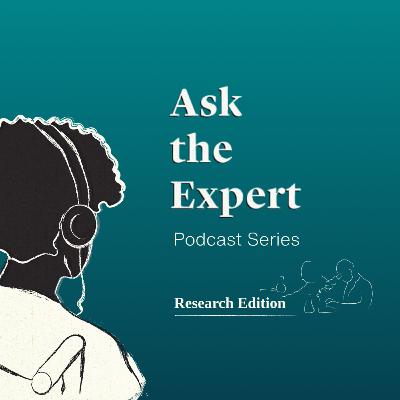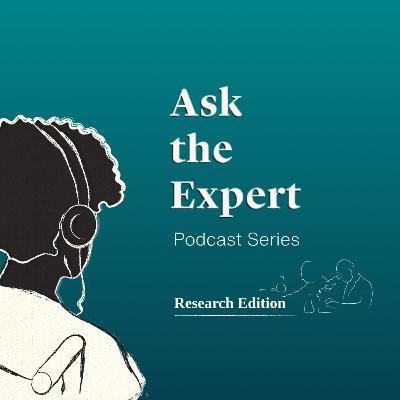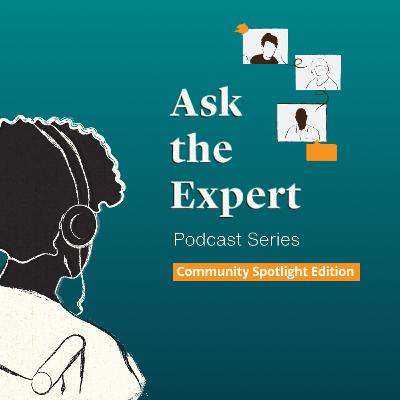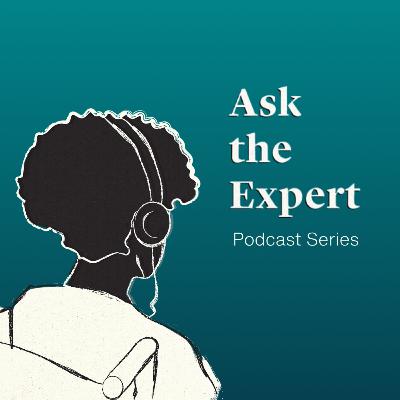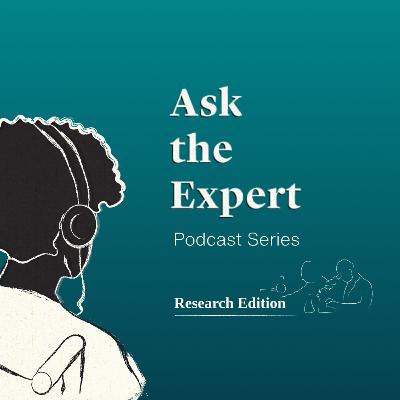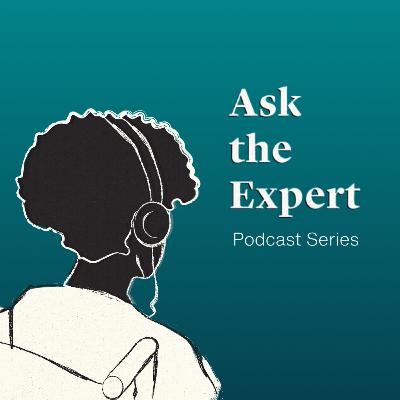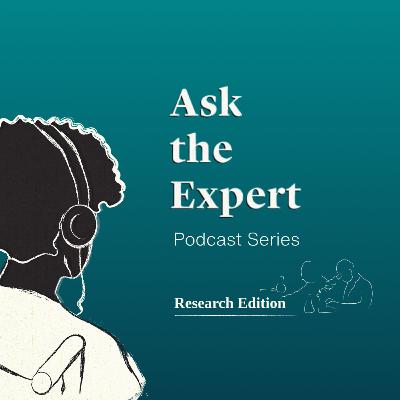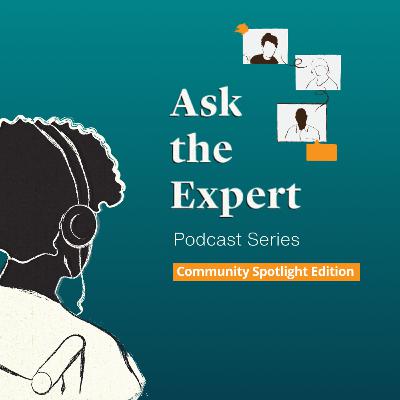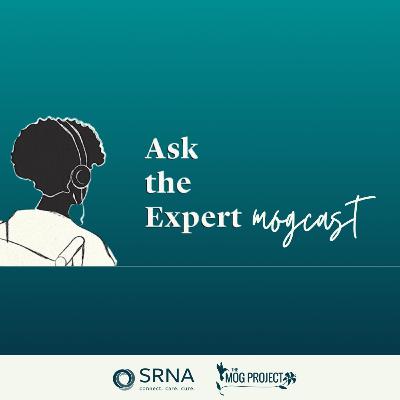Discover SRNA Soundwaves (previously Ask the Expert)
SRNA Soundwaves (previously Ask the Expert)

SRNA Soundwaves (previously Ask the Expert)
Author: Siegel Rare Neuroimmune Association (SRNA)
Subscribed: 17Played: 364Subscribe
Share
© 062634
Description
SRNA Soundwaves is a podcast network that brings together expert insight, research updates, and experiences from the rare neuroimmune disorder community. Through multiple series, SRNA Soundwaves connects those living with rare neuroimmune disorders, caregivers, clinicians, and researchers with trusted information and meaningful conversations that educate, empower, and inspire. Topics include acute disseminated encephalomyelitis (ADEM), acute flaccid myelitis (AFM), MOG antibody disease (MOGAD), neuromyelitis optica spectrum disorder (NMOSD), optic neuritis (ON), and transverse myelitis (TM).
210 Episodes
Reverse
In part six of the “Ask the Expert, Research Edition” mini-series, “Parenting is Hard,” Krissy Dilger of SRNA was joined by Barbara Babcock, a family therapist from the UK's National Health Service, to discuss the role of siblings in families with a child diagnosed with a rare neuroimmune disorder. Barbara shared findings from her research on how siblings provide crucial support to parents and the positive impacts this has on family dynamics [00:04:31]. They explored the concept of parentification and the importance of assigning age-appropriate tasks to siblings [00:25:10]. Barbara also provided advice on fostering healthy sibling relationships and the significance of open communication [00:35:34]. At the end of this mini-series, we will host a Q&A episode where Barbara will answer questions from the community. To submit your question, please visit https://srna.ngo/submitBarbara Babcock works as a Family Therapist in a child and adolescent mental health outpatient unit in the United Kingdom's National Health Service. In her private practice, she works with individuals and couples who are navigating challenging health issues and wish to get their lives back. She obtained her Master of Science in Family Therapy from the Institute of Psychiatry, Psychology, and Neuroscience at King's College London. Barbara also has a Master of Arts in Coaching Psychology/Psychological Coaching and her dissertation research focused on the impact that a systemic approach to coaching has on the wellbeing of adults who have a rare neuroimmune disorder and their primary caregivers. Previously, she was Chair of the Transverse Myelitis Society, from 2013 to 2016, and led their Family Weekend from 2015 to 2019, an event to support families who have a child/adolescent with a rare neuroimmune disorder to discover their potential through challenging outdoor activities. She had transverse myelitis in 2008 and is originally from Pennsylvania, USA. You can contact her at barbara@returntowellness.co.uk and her website is www.returntowellness.co.uk00:00 Introduction00:28 Meet Barbara Babcock02:08 Theme Four: Support from Siblings04:31 Siblings' Characteristics and Their Impact06:57 Voluntary Help from Siblings25:10 Parentification: Understanding the Concept36:34 Fostering Healthy Sibling Relationships39:20 Conclusion and Final Thoughts
In this episode of the SRNA "Ask the Expert" podcast moderated by Dr. GG deFiebre, Dr. Kyle Blackburn and Dr. Benjamin Greenberg discussed the need for updated diagnostic criteria for myelitis. Dr. Blackburn explained the term myelitis and the importance of precise terminologies for accurate diagnoses and research [00:05:10]. Dr. Greenberg elaborated on the advancements in testing and understanding of associated disorders like NMOSD and MOGAD since 2002 [00:11:10]. Both experts stated that the shift from "transverse myelitis" to "myelitis" will aid future research, treatments, and patient care [00:17:27]. They reassured patients that these changes would essentially refine their care but not alter it dramatically [00:23:40]. They encouraged patients to stay informed and communicate with their healthcare providers about these updates [00:28:58].Kyle Blackburn, MD is an Assistant Professor in the Department of Neurology at UT Southwestern Medical Center in Dallas, Texas. He specializes in neuroimmunology and has clinical interests in antibody-mediated neurologic disorders, including autoimmune encephalitis, epilepsy, and ataxias; neurologic complications of cancers, including paraneoplastic disorders and checkpoint inhibitor/CAR T-cell toxicity; and demyelinating disorders, including sarcoidosis, neuromyelitis optica, myelin oligodendrocyte glycoprotein (MOG)-associated disease, and multiple sclerosis. Dr. Blackburn earned his medical degree at the University of Kentucky College of Medicine. He performed his residency in adult neurology at UT Southwestern, serving his final year as Chief Resident, and stayed to complete a fellowship in neuroimmunology, during which he earned the James T. Lubin Clinician Scientist Award from the Siegel Rare Neuroimmune Association (SRNA). He joined the UT Southwestern faculty in 2020.Benjamin M. Greenberg, M.D., M.H.S. is a Professor and the Cain Denius Scholar in Mobility Disorders in the Department of Neurology at UT Southwestern Medical Center in Dallas, Texas. He currently serves as the Vice Chair of Translational Research and Strategic Initiatives for the Department of Neurology. He is also the interim Director of the Multiple Sclerosis Center and the Director of the Neurosciences Clinical Research Center. In addition, he serves as Director of the Transverse Myelitis and Neuromyelitis Optica Program and the Pediatric Demyelinating Disease Program at Children’s Medical Center.Dr. Greenberg earned his medical degree at Baylor College of Medicine before completing an internal medicine internship at Chicago’s Rush Presbyterian-St. Luke’s Medical Center. He performed his neurology residency at the Johns Hopkins School of Medicine. He also holds an M.H.S. in molecular microbiology and immunology from the Bloomberg School of Public Health, as well as a bachelor’s degree in the history of medicine – both from Johns Hopkins. Prior to his recruitment to UT Southwestern in 2009, Dr. Greenberg was on the faculty of the Johns Hopkins Division of Neuroimmunology, serving as the Director of the Encephalitis Center and Co-Director of the nation’s first dedicated Transverse Myelitis Center.Dr. Greenberg splits his clinical time between adult and pediatric patients at William P. Clements Jr. and Zale Lipshy University Hospitals, Parkland, and Children’s Medical Center. His research focuses on better diagnosing, prognosticating, and treating demyelinating diseases and nervous system infections. He also coordinates clinical trials to evaluate new treatments to prevent neurologic damage and restore function to affected patients. 00:00 Introduction00:58 Overview of Myelitis and Diagnostic Criteria02:57 Historical Context and Importance of Updated Criteria05:10 Challenges with Current Terminology11:10 Changes in Understanding and Diagnostic Approaches17:27 Implications for Patients and Clinical Practice23:40 Impact on Research and Future Directions28:58 Patient Advocacy31:17 Conclusion
Krissy Dilger of the Siegel Rare Neuroimmune Association (SRNA) was joined by experts Janet Dean, MS, RN, CRRN, CRNP and Florence Hanssen, RN to discuss skin health and the prevention of skin breakdown. The conversation covered the structure of the skin and how paralysis affects skin health [00:01:48]. Key topics included the role of daily skin checks, moisture management, and the importance of pressure relief [00:11:48]. They also reviewed how nutrition, rehabilitation, and technology can aid in the prevention and treatment of skin breakdown [00:17:51]. Lastly, the episode covered the signs of serious skin issues and when to seek medical attention [00:50:18].Janet Dean, MS, RN, CRRN, CRNP attended nursing school at the University of Michigan, completing a master’s degree in parent-child nursing in 1979. She is a board-certified Pediatric Nurse Practitioner and is also a Certified Rehabilitation Registered Nurse. She has over 30 years of experience in the specialty of pediatric rehabilitation. Prior to becoming a nurse practitioner, Ms. Dean enjoyed 10 years as a staff nurse on a pediatric rehabilitation unit caring for children with physical and developmental disability. As a nurse practitioner for the International Center for Spinal Cord Injury, she specialized in the prevention and treatment of the common health consequences of pediatric spinal cord injury. The focus of her practice is on health promotion and health maintenance.Florence Hanssen, RN is a nurse coordinator at the Kennedy Krieger Institute’s International Center for Spinal Cord Injury. She obtained her licensure in 1993, and her bachelor’s in nursing science from Ohio University in 2014. Her primary interests are in wound care and the continuous outpatient healthcare for those living with spinal cord injury/ disease. She earned her wound care nurse certification in 2023. 00:00:00 Introduction00:00:17 Meet the Experts00:01:48 Understanding Skin Structure and Function00:03:59 What is Skin Breakdown?00:05:49 Impact of Paralysis on Skin Health00:08:15 Causes of Skin Breakdown00:11:48 Preventing Skin Breakdown00:14:00 Mechanical Injuries and Skin Health00:16:21 Hygiene Practices for Skin Health00:17:51 Nutrition and Skin Health00:20:17 Rehabilitation and Skin Health00:23:15 Preventing Pressure Ulcers00:28:58 Managing Muscle Spasms00:31:28 Identifying and Treating Minor Skin Breakdown00:34:14 Understanding and Treating Minor Skin Irritations00:36:24 Identifying Pressure Points and Vulnerable Areas00:40:17 Managing Scrapes and Tears During Transfers00:43:21 Preventing Skin Breakdown Under Braces00:47:20 Addressing Skin Breakdown in Perineal Areas00:50:18 Recognizing and Treating Serious Skin Breakdown01:03:46 The Role of Technology and Resources in Skin Care01:06:32 Final Thoughts and Advice
At the end of this mini-series, we will host a Q&A episode where Barbara will answer questions from the community. To submit your question, please visit https://srna.ngo/submitIn the fourth part of the “Ask the Expert, Research Edition” mini-series, “Parenting is Hard,” Krissy Dilger of SRNA continued her conversation with Barbara Babcock. In this episode, Barbara, a family therapist, discussed her research of parental fatigue and limited time distribution among families of children who have been diagnosed with a rare neuroimmune disorder. She elaborated on the non-stop nature of caregiving roles and the impact of work and daily parenting responsibilities on parental exhaustion [00:05:10]. Barbara emphasized the importance of parents finding ways to cope, from getting social support to attending to their own basic needs [00:17:35]. She highlighted the significance of confidence in navigating the complexities of family life and caregiving for a child with special needs [00:21:27].00:00 Introduction01:29 Theme Two: "I Can Only Split Myself So Many Ways"05:10 Parental Exhaustion and Coping Mechanisms17:35 Balancing Social and Extracurricular Activities21:27 Building Confidence as a Family23:28 ConclusionBarbara Babcock works as a Family Therapist in a child and adolescent mental health outpatient unit in the United Kingdom's National Health Service. In her private practice, she works with individuals and couples who are navigating challenging health issues and wish to get their lives back. She obtained her Master of Science in Family Therapy from the Institute of Psychiatry, Psychology, and Neuroscience at King's College London. Barbara also has a Master of Arts in Coaching Psychology/Psychological Coaching and her dissertation research focused on the impact that a systemic approach to coaching has on the wellbeing of adults who have a rare neuroimmune disorder and their primary caregivers. Previously, she was Chair of the Transverse Myelitis Society, from 2013 to 2016, and led their Family Weekend from 2015 to 2019, an event to support families who have a child/adolescent with a rare neuroimmune disorder to discover their potential through challenging outdoor activities. She had transverse myelitis in 2008 and is originally from Pennsylvania, USA. You can contact her at barbara@returntowellness.co.uk and her website is www.returntowellness.co.uk
At the end of this mini-series, we will host a Q&A episode where Barbara will answer questions from the community. To submit your question, please visit https://srna.ngo/submitIn the third part of the “Ask the Expert, Research Edition” mini-series, “Parenting is Hard,” Krissy Dilger of SRNA was joined by Barbara Babcock to further explore her research concerning the changing beliefs around parenting when a child has been diagnosed with a rare neuroimmune disorder. Barbara discussed how beliefs around being fair as a parent could change and the various sub-themes supporting this idea, including redefinition of fairness and the challenge of balancing attention among children [00:03:30]. She highlighted the impact of societal and historical contexts on parenting norms and the struggles parents face in managing new caregiving responsibilities and learning new skills [00:12:45]. The importance of redefining what it means to be a good parent in the context of a child with additional needs was emphasized throughout the episode [00:24:00]. Barbara Babcock works as a Family Therapist in a child and adolescent mental health outpatient unit in the United Kingdom's National Health Service. In her private practice, she works with individuals and couples who are navigating challenging health issues and wish to get their lives back. She obtained her Master of Science in Family Therapy from the Institute of Psychiatry, Psychology, and Neuroscience at King's College London. Barbara also has a Master of Arts in Coaching Psychology/Psychological Coaching and her dissertation research focused on the impact that a systemic approach to coaching has on the wellbeing of adults who have a rare neuroimmune disorder and their primary caregivers. Previously, she was Chair of the Transverse Myelitis Society, from 2013 to 2016, and led their Family Weekend from 2015 to 2019, an event to support families who have a child/adolescent with a rare neuroimmune disorder to discover their potential through challenging outdoor activities. She had transverse myelitis in 2008 and is originally from Pennsylvania, USA. You can contact her at barbara@returntowellness.co.uk and her website is www.returntowellness.co.uk00:00 Introduction 00:27 Meet the Expert: Barbara Babcock01:38 Exploring Parental Beliefs and Fairness03:37 Balancing Attention Among Children07:49 Cultural and Societal Influences on Parenting11:08 Challenges in Managing Illness and Fairness19:37 Learning New Skills and Roles25:52 Redefining Good Parenting27:43 Conclusion
In this "Community Spotlight Edition" of "Ask the Expert," Landy Thomas of SRNA talked with Marie Abrego and Dr. Roopa Ramamoorthi about visual impairment and their collaborative book of poetry, Rare Visions, published through the Ipsen Foundation. Dr. Ramamoorthi shared her inspiration for the collection of work from individuals who have been diagnosed with rare diseases [00:02:35]. Landy read select poems from Rare Visions, and the guests offered personal insights into their adapted lives and the significance of accessible technology [00:08:57]. Finally, they discussed the importance of raising awareness about rare diseases and accessibility issues through poetry [00:31:05]. Roopa Ramamoorthi, PhD is a scientist in the field of global health and published poet as well as director for the Catalyst program and InVent Fund at UC San Francisco. Her poetry essays and short stories have appeared in over 80 publication including various anthologies and "Perspectives" on NPR. Most recently, she conducted poetry workshops with people living with rare diseases. She feels honored to have now worked with those with rare eye diseases and to help send their voices out into the world. The poetry collections Rare Sounds and Rare Visions were published by the Ipsen Foundation:https://www.fondation-ipsen.org/?s=Roopa+RamamoorthiMarie Abrego is proud to be the Welcome Manager for The Sumaira Foundation. Diagnosed with NMO in 2007 when she was only 14 years old, she shared the story of her diagnosis a few years ago, but as she learned, life doesn’t stop with NMO. In 2019, she joined The Sumaira Foundation as one of the first patient TSF Ambassadors representing the state of New Mexico.00:00 Introduction01:18 Meet Marie Abrego and Dr. Roopa Ramamoorthi01:58 The Power of Poetry in Rare Disease Awareness04:37 Challenges of Living with Vision Impairment09:12 Adapting to Vision Loss: Tools and Techniques14:14 Expressing Through Poetry: Marie Abrego's Work21:21 Makeup and Femininity22:33 The Emotional Impact of Blindness25:20 Reading and Discussing Poems by Landy Thomas33:29 Leah Campbell's Powerful Poems38:21 Final Thoughts
In this episode of "Ask the Expert," Dr. Matthew Bellman joined Dr. GG deFiebre of SRNA to explain the basics of functional electrical stimulation (FES) and its applications. Dr. Bellman outlined how FES differs from other electrical stimulation techniques and its role in improving mobility for those with neuroimmune disorders [00:03:35]. He discussed the specific benefits of FES, including muscle strengthening and managing spasticity, and shared success stories demonstrating its impact [00:09:53]. Dr. Bellman also highlighted new developments in FES technology, particularly the integration of AI [00:33:28].Matthew Bellman, PhD is a Founder and the Chief Technology Officer for MYOLYN, Inc. Dr. Bellman is a Triple-Gator with bachelor’s, master’s, and doctorate degrees in mechanical engineering from the University of Florida (UF). In 2013, Dr. Bellman co-founded MYOLYN to commercialize his doctoral research on mobility assistance for people with paralysis and muscle weakness using functional electrical stimulation (FES) and robotics. In his time at MYOLYN, Dr. Bellman has been responsible for building a certified medical device quality management system, managing a team of engineers in the design and development of two Class II medical devices, obtaining grant funding from the National Institutes of Health (NIH), and growing a small business. Dr. Bellman has been awarded the Entrepreneurial Spirit Award by UF’s Center for Entrepreneurship and Innovation, the O. Hugo Schuck Best Paper Award by the American Automation Control Council, and the Outstanding Young Alumnus Award by the UF Department of Mechanical and Aerospace Engineering. In 2019, Dr. Bellman secured MYOLYN’s place as a finalist in the Toyota Mobility Unlimited Challenge. In addition to his role at MYOLYN, Dr. Bellman has also served as a member of the Board of Directors for NextStep Orlando’s Paralysis Recovery Center and as a member of the Advisory Council for the American Bionics Project. Dr. Bellman’s work has been published in high-impact scientific journals including Muscle & Nerve, IEEE Transactions on Control Systems Technology, and The Journal of NeuroEngineering and Rehabilitation, and he has been an invited guest speaker at universities around the world including UF, École Normale Supérieure (ENS) de Lyon, and the Tokyo Institute of Technology. When not at work, Dr. Bellman can be found trail running or relaxing at home with his wife and family.00:00 Introduction00:31 Meet Dr. Matthew Bellman00:52 Understanding Functional Electrical Stimulation (FES)01:30 Historical Context and Early Applications of FES03:35 How FES Works in the Body07:05 FES for Spinal Cord Damage and Neuromuscular Disorders09:53 Benefits of FES for Various Symptoms13:44 Evidence and Secondary Benefits of FES17:47 Typical FES Session and Accessibility24:06 Success Stories and Patient Feedback29:25 Barriers to FES Adoption33:28 Future Developments in FES Technology36:46 Final Thoughts and Encouragement
At the end of this mini-series, we will host a Q&A episode where Barbara will answer questions from the community. To submit your question, please visithttps://srna.ngo/submitIn the second part of the “Ask the Expert, Research Edition” mini-series, “Parenting is Hard,” Barbara Babcock shared more about her research on how parents navigate the needs of their non-diagnosed children alongside those of a child with a rare neuroimmune disorder. She described the demographic details of the participating families and the process of recruiting participants for the study [00:02:25]. Barbara highlighted her unique perspective and the potential biases she brought to the research as a non-parent [00:05:33]. She emphasized the importance of honesty and vulnerability in sharing experiences, as well as focusing on the strengths of families facing these challenges [00:09:46]. Barbara Babcock works as a Family Therapist in a child and adolescent mental health outpatient unit in the United Kingdom's National Health Service. In her private practice, she works with individuals and couples who are navigating challenging health issues and wish to get their lives back. She obtained her Master of Science in Family Therapy from the Institute of Psychiatry, Psychology, and Neuroscience at King's College London. Barbara also has a Master of Arts in Coaching Psychology/Psychological Coaching and her dissertation research focused on the impact that a systemic approach to coaching has on the wellbeing of adults who have a rare neuroimmune disorder and their primary caregivers. Previously, she was Chair of the Transverse Myelitis Society, from 2013 to 2016, and led their Family Weekend from 2015 to 2019, an event to support families who have a child/adolescent with a rare neuroimmune disorder to discover their potential through challenging outdoor activities. She had transverse myelitis in 2008 and is originally from Pennsylvania, USA. You can contact her at barbara@returntowellness.co.uk and her website is www.returntowellness.co.uk00:00 Introduction01:29 Overview of Barbara's Research02:25 Participant Demographics and Methodology05:33 Researcher’s Perspective and Bias09:46 Themes and Insights from the Research12:24 Conclusion
At the end of this mini-series, we will host a Q&A episode where Barbara Babcock will answer questions from the community. To submit your question, please visit:https://srna.ngo/submitIn the first part of the “Ask the Expert, Research Edition” mini-series, “Parenting is Hard,” Barbara Babcock discussed the challenges faced by parents raising a child with a rare neuroimmune disorder and the impact on non-diagnosed siblings. Barbara shared her personal journey with transverse myelitis (TM) and how it led her to conduct research on this topic [00:02:20]. She explored themes from her research, highlighting fairness in parenting, and the role of sibling support [00:13:03]. Finally, Barbara emphasized the importance of adapting parenting strategies to balance the needs of all children in the family [00:15:42]. Barbara Babcock works as a Family Therapist in a child and adolescent mental health outpatient unit in the United Kingdom's National Health Service. In her private practice, she works with individuals and couples who are navigating challenging health issues and wish to get their lives back. She obtained her Master of Science in Family Therapy from the Institute of Psychiatry, Psychology, and Neuroscience at King's College London. Barbara also has a Master of Arts in Coaching Psychology/Psychological Coaching and her dissertation research focused on the impact that a systemic approach to coaching has on the wellbeing of adults who have a rare neuroimmune disorder and their primary caregivers. Previously, she was Chair of the Transverse Myelitis Society, from 2013 to 2016, and led their Family Weekend from 2015 to 2019, an event to support families who have a child/adolescent with a rare neuroimmune disorder to discover their potential through challenging outdoor activities. She had transverse myelitis in 2008 and is originally from Pennsylvania, USA. You can contact her at barbara@returntowellness.co.uk and her website is www.returntowellness.co.uk00:00 Introduction01:26 Meet Barbara Babcock: A Journey into Family Therapy02:20 Barbara's Personal Experience with TM03:20 Creating Support Systems for Families06:35 Research Focus: Parenting and Sibling Dynamics13:03 Themes from the Research15:42 The Importance of Fairness and Balance18:38 Challenges and Guilt in Parenting24:33 Conclusion
Krissy Dilger of SRNA moderated this "Ask the Expert" episode, “Pelvic Floor Therapy for Bladder and Bowel Management,” featuring Jessica Ekberg, a certified pelvic floor therapist. Jessica explained the various conditions treated by pelvic floor therapy, emphasizing the importance of posture and breathing [00:01:05]. She discussed how pelvic floor therapy is adapted for individuals with rare neuroimmune disorders [00:04:59]. The discussion included both physical exercises and emotional work integral to the therapy [00:07:42]. Practical tips for seeking pelvic floor therapy and insurance considerations were also covered [00:10:42]. The episode concluded with encouragement to explore this underutilized service [00:19:23].00:00 Introduction02:03 Understanding Pelvic Floor Therapy04:59 Pelvic Floor Therapy for Rare Neuroimmune Disorders07:42 The Emotional and Mental Aspects of Pelvic Floor Therapy10:42 Practical Insights and Patient Experiences19:23 Getting Started with Pelvic Floor Therapy27:38 ConclusionJessica Ekberg, OTR/L is a business owner, avid runner, former pants peer, prolapse owner, postpartum pain sufferer, mom of two, and certified pelvic floor therapist. Jessica is extremely passionate about helping men and women be the best version of themselves they can. Her goal is to bring Pelvic Floor Health discussions to the forefront of what she does, to help dispel myths and educate about facts. The lack of information and effective treatment in the community can leave people suffering in silence. Now that she has been working in pelvic health for almost five years, she realizes just how critical pelvic health is to all of us. She started her pelvic health journey after experiencing “a lot of problems” when returning to running post baby.Jessica’s advice is to stop ignoring or putting off taking care of yourself. The core makes up the foundation of the body and if it is not functioning properly, it can impact several systems within the body. Some of the problems that clients present with are incontinence, hernias, pelvic pain including hips/back/genital/rectal/tailbone, respiratory difficulties, heavy/painful periods, menopause, endometriosis, pre/during/postpartum care, constipation, and sexual (including erectile) dysfunction. Jessica’s approach involves assessing the whole body, putting the puzzle together in order to determine the driver of the dysfunction and then developing a treatment plan to solve the problem. Her goal is to help clients return to doing all of the things they love, as quickly and safely as possible.
In this episode of "Ask the Expert," Dr. Eoin Flanagan joined Dr. GG deFiebre of SRNA. Dr. Flanagan explained how immunosuppressive medications impact the immune system and the efficacy of vaccines [00:02:45]. He discussed the primary concerns and risks of vaccinating individuals on these therapies, including avoiding live vaccines and the need for additional booster doses [00:04:52]. Dr. Flanagan also talked about the recommended vaccines for those with conditions like NMOSD or MOGAD, and underlined the importance of getting vaccinated to prevent severe infections [00:09:40]. He addressed common misconceptions and emphasized the role of healthcare providers in educating and supporting their patients regarding vaccinations [00:15:32].Eoin Flanagan, MB, BCh is a Professor of Neurology and Consultant in the departments of Neurology and Laboratory Medicine and Pathology at the Mayo Clinic (Rochester, MN). He completed his medical school training at University College Dublin in Ireland in 2005. He did a medical residency in Ireland and then completed neurology residency, fellowships in neuroimmunology and a masters in clinical and translational science at Mayo Clinic (Rochester, MN). He works in the Autoimmune Neurology and Multiple Sclerosis Clinics and the Neuroimmunology Laboratory at the Mayo Clinic. His clinical expertise and research are focused on inflammatory myelopathies and their imaging patterns, myelin oligodendrocyte glycoprotein (MOG) antibody associated disorder, neuromyelitis optica spectrum disorders, autoimmune encephalitis, paraneoplastic neurologic disorders, and multiple sclerosis. He is principal investigator on an NIH RO1 grant studying MOG antibody associated disorder.00:00 Introduction 00:47 Understanding Immunosuppressants and Vaccines01:28 Primary Concerns with Vaccinating Immunosuppressed Patients02:30 Recommended Vaccines for Immunosuppressed Patients07:11 Timing and Effectiveness of Vaccinations08:21 Measuring Vaccine Response09:24 Addressing Missed Doses and Safety Considerations16:41 Public Health Implications and Patient Advocacy17:56 Advice for Vaccine-Hesitant Patients19:06 Healthcare Providers' Role in Vaccination20:03 Conclusion and Final Thoughts
In this "Ask the Expert" episode, Dr. GG deFiebre of SRNA was joined by Dr. Rebecca Martin, who detailed the mechanism and benefits of transcutaneous spinal cord stimulation (TSS). Dr. Martin explained how TSS, a non-invasive method, aims to amplify spinal cord excitability and improve neurological functions like movement and sensation [00:01:25]. She contrasted TSS with implanted spinal stimulators, noting their respective applications and advantages [00:02:34]. Dr. Martin shared the promising outcomes of TSS in clinical trials, emphasizing its potential for widespread clinical use, and she urged patients to inquire about it at their clinics [00:05:42]. You can read her group's recent paper here: "Transcutaneous Spinal Cord Stimulation Enables Recovery of Walking in Children with Acute Flaccid Myelitis"https://www.mdpi.com/2227-9067/11/9/1116Rebecca Martin, OTR/L, OTD, CPAM received her Bachelor of Science in Occupational Therapy from Boston University in 2001 and her Occupational Therapy Doctorate from Rocky Mountain University of Allied Health Professions in 2008. Prior to joining the Kennedy Krieger Institute, Dr. Martin worked in brain injury rehabilitation in Boston, Massachusetts.Dr. Martin joined Kennedy Krieger in 2005 as a Senior Occupational Therapist in the International Center for Spinal Cord Injury. Since 2010, Dr. Martin has been the Manager of Clinical Education and Training at ICSCI and is responsible for program development, staff training, and oversight of the clinical research program. Dr. Martin speaks nationally on topics related to Activity-Based Rehabilitation; she has taught many continuing education courses for rehabilitation professionals in the areas of neurological pathology, rehabilitation, and research. She has been the principal investigator and co-investigator for grants from the Paralyzed Veterans of America Education Foundation and Department of Defense to develop, promote, and disseminate an activity-based restorative therapy training program and curriculum.In 2011, Dr. Martin was awarded the Leader in Spinal Cord Injury Care by the International Center for Spinal Cord Injury at Kennedy Krieger. From 2011-2016, Dr. Martin served as a Committee Chair for the annual Contemporary Trends in Spinal Cord Injury Management Symposium at Kennedy Krieger. As a consultant for SwissStim, she has helped create clinical use guidelines for training and documentation. In 2015, Dr. Martin was invited to serve on the NIH and NINDS Committee to establish Pediatric Spinal Cord Injury Common Data Elements.
In this "Ask the Expert" episode titled, "Women's Health within Neuroimmunology," Dr. Sonia Singh joined Krissy Dilger of SRNA to share women's health concerns within the context of neuroimmunology, focusing on issues like fertility and pregnancy for those with rare neuroimmune disorders [00:01:20]. Dr. Singh discussed how certain conditions, such as neuromyelitis optica spectrum disorder (NMOSD) and autoimmune encephalitis, and medications could impact fertility [00:03:45]. They also explored the increased risks of relapse during and after pregnancy and the importance of coordinated care between neurologists and obstetricians [00:07:10]. Dr. Singh emphasized the importance of teamwork during pregnancy to ensure optimal outcomes for both mother and child [00:21:45].Sonia Kaur Singh, MD is a Neurologist and Assistant Professor of Neurology at Medical University of South Carolina (MUSC), Charleston who specializes in Neuroimmunology. Dr. Singh obtained her medical degree from Kasturba Medical College, Mangalore in Southern India. After graduation, she worked with dementia specialists in India studying dementia in culturally and linguistically diverse populations. She completed her neurology residency at University of Texas Health Science Center Houston (UTHealth Houston) in the Texas Medical Center. During residency, she was involved with innovative learning strategies including a structural competency curriculum and graduated with the prestigious Frank Yatsu Award for Excellence in Clinical Neurology. After residency, she completed a one-year fellowship in Multiple Sclerosis and Neuroimmunology from UTHealth Houston where she was actively involved in medical education and clinical trials. Dr. Singh has a special interest in women’s health and cognition in neuroimmune conditions.
In this "Ask the Expert" episode titled, "Self Identity and Finding Meaning Following Diagnosis," Krissy Dilger of SRNA spoke with Susan Y. Wegener, LCSW, a licensed clinical social worker, about coping with a chronic diagnosis and its emotional adjustments, referencing Kübler-Ross’ stages of grief [00:03:45]. Susan discussed the importance of self identity transformation post-diagnosis and the need for patience and self-compassion in finding new ways to move forward [00:08:34]. The value of inner strength, setting priorities, and support groups for reducing isolation and fostering compassion was emphasized [00:15:20]. The discussion concluded with a focus on post-traumatic growth, highlighting greater life appreciation and mental flexibility as key coping strategies [00:16:01].Susan Y. Wegener, LCSW is a licensed clinical social worker who maintains a private psychotherapy practice in Austin, TX. Her clinical practice specializes in work with individuals coping with chronic medical diagnoses. She completed her undergraduate degree, in Psychology, from Skidmore College, Saratoga Springs N.Y., 1993 and her graduate degree, in Social Work from Columbia University, New York City in 1995. In addition to her private practice, she has worked in multiple medical settings throughout her career and helped to empower and support individuals from diagnosis through the adjustment process. She became a Partner in Care for the National Multiple Sclerosis Society in 2017 and is passionate about her work with individuals diagnosed with MS and various other neurological diagnoses. In her free time, she enjoys singing in a local chorus, cooking, swimming, and spending time with her family. Please see the following link to her workbook “Hold on to Hope.” https://www.amazon.com/Hold-Hope-Overview-Strategies-Chronic/dp/151221871500:00 Introduction to the Podcast00:37 Meet the Expert: Susan Wagner01:00 Coping with a Chronic Diagnosis01:47 The Emotional Adjustment Process05:36 Understanding Self Identity Post-Diagnosis08:34 Dealing with Denial10:39 Coping Strategies for Shifting Self Identity14:08 Finding Meaning and Purpose14:26 Exploring the Impact of Diagnosis15:25 Reflecting on Values and Strengths16:06 Coping Strategies for Finding Meaning16:29 The Role of Relationships and Support Systems18:05 Prioritizing Self-Care and Realistic Goals20:04 Finding Meaning in Suffering20:15 The Concept of Post-Traumatic Growth24:52 The Importance of Stillness and Self-Compassion28:31 Mental Flexibility and Creative Thinking30:02 Conclusion and Final Thoughts
In this episode titled, "Operant Conditioning Rehabilitation Studies," part of the "Ask the Expert: Research Edition" series, Krissy Dilger of SRNA was joined by Dr. Aiko Thompson. Dr. Thompson explained the fundamental principles of operant conditioning and its application in enhancing motor function and sensory pathways in individuals with spinal cord damage due to neuroimmune disorders [00:01:02]. They delved into specific trials aimed at improving spasticity, foot drop, and neuropathic pain, highlighting current studies and ongoing trials [00:02:28]. Dr. Thompson shared details on how eligible participants can take part in these studies and the promising potential outcomes [00:13:39].Aiko Thompson, PhD is a neuroscientist and an associate professor in the College of Health Professions, Medical University of South Carolina, Charleston, SC. She did her PhD with Dr. Richard Stein at the University of Alberta, Canada, and then did a postdoc training with Dr. Jonathan Wolpaw at the Wadsworth Center in Albany, NY. During her PhD, she was engaged in non-invasive human neurophysiology / plasticity research related to the use of FES (functional electrical stimulation) foot drop simulator. She also started investigating normal and abnormal spinal reflex modulation during walking and other dynamic movements in people with and without chronic CNS disorders. Then, during her postdoc, she developed the human H-reflex operant conditioning protocol. In 2007, Dr. Thompson established her own lab. Since then, she has been working on understanding CNS plasticity in human sensorimotor control and how to guide the plasticity to help restore useful function in people after CNS damage. Her current research focuses on investigating functional roles of spinal reflexes and evaluating the CNS plasticity associated with operant conditioning of EMG evoked responses (e.g., spinal reflexes and motor evoked potential to transcranial magnetic stimulation) in people with SCI and other neuromuscular disorders. Her ongoing research is funded by NIH, DoD, South Carolina funds, and private endorsements.00:00 Introduction to the Podcast and Guest01:02 Understanding Operant Conditioning02:28 Background and Development of Operant Conditioning Trials05:33 Current Research and Clinical Trials09:43 Setup and Participation in Studies11:50 Study Results and Future Directions13:39 How to Get Involved14:29 Acknowledgements and Sponsor Information
In this episode of "Ask the Expert," hosted by Krissy Dilger of SRNA, Dr. Shuvro Roy talked about the importance of legislative advocacy in healthcare [00:01:10]. Dr. Roy discussed how physicians can engage in legislative advocacy by sharing their practice stories and providing technical expertise [00:05:05]. He emphasized the crucial role of patients in advocacy, highlighting that their personal stories carry significant weight with legislators [00:07:45]. Dr. Roy also shared examples of successful advocacy efforts, such as telemedicine policy changes and Medicare reforms, contributing to better patient outcomes [00:15:10].Shuvro Roy, MD is an assistant professor of Neurology at the University of Washington, specializing in Neuroimmunology. He completed his neuroimmunology and neuroinfectious disease fellowship at Johns Hopkins University. He graduated from Medical School at Ohio State University and completed his neurology residency at University of California, Los Angeles. Dr. Roy is actively engaged with a number of projects to improve access to care, healthcare inequality, and patient safety for people with MS and related conditions, with a special interest in neuromyelitis optica and MOG antibody disease. His primary research focus examines how to better leverage health systems to understand and treat neuroimmunologic disorders. He chose to work with people who have MS and rare neuroimmunologic conditions because of the opportunity to build longstanding patient-provider relationships and to help his patients thrive in the face of challenging lifelong conditions.
In this episode of "Ask the Expert, Community Spotlight Edition," Lydia Dubose of SRNA spoke with Kim Harrison about her journey with transverse myelitis (TM), adaptive sports, and challenges she has faced since her diagnosis [00:01:25]. Kim highlighted the importance of community support systems in her life [00:11:38]. She discussed managing symptoms, navigating social situations, and raising awareness for rare neuroimmune disorders [00:17:39]. Finally, Kim shared her inspiring story of completing the 500-mile Camino de Santiago in her adaptive wheelchair, demonstrating resilience and determination [00:23:49].Originally from Atlanta, GA, Kim Harrison currently resides in St. Augustine, FL. She contracted transverse myelitis (TM) in 2004 while on a business trip to Dallas, TX. In 2012, she partitioned her State Senator, Donzella James, to declare February 15th as Transverse Myelitis Awareness Day. She is on the mayor’s accessibility committee, a United Spinal Association North Florida Chapter Advocacy Representative, a Christopher and Dana Reeve Peer Mentor, and a volunteer at Brooks Rehabilitation Hospital. Kim organized a Walk-Run-N-Roll and has been a support group leader with SRNA. She has been on the Braves Stadium ADA advisory board, has participated in ROCH Roll on Capitol Hill with United Spinal Association, and has advocated for wheelchair users’ rights for activity based physical therapy with Warrior Momz. Kim is the adaptive athlete who rolled the 500-mile Camino de Santiago in Spain with her adaptive GRIT Freedom wheelchair. She is 65 and lives in an aged community with her husband of 38 years, Brian.You can learn more about the organization I'll Push You and Kim's journey on the Camino de Santiago here:https://www.accessiblecamino.com/https://www.facebook.com/groups/1051370995944241/
In this "Ask the Expert, Community Spotlight" episode, Krissy Dilger of SRNA was joined by Paula Jones, a filmmaker from New Zealand, who discussed her journey with transverse myelitis (TM) and how it has impacted her life and career [00:01:34]. She shared her diagnosis story, detailing the sudden onset of symptoms and the challenges she faced during and after her hospital stay [00:02:26]. Paula talked about her struggles with acceptance, the financial difficulties she faced, and her determination to continue her work [00:07:00]. She also introduced her show, "Spinal Destination," which draws on her experiences and aims to bring the disabled community into mainstream media [00:13:51]."Spinal Destination" from Whitiora Productions is currently streaming in New Zealand:https://www.skygo.co.nz/show/mac_sh_136130https://whitioraproductions.com/whitiora-productionsPlease note: The following trailer is intended for adult audiences:https://youtu.be/BooV5W3Cmt8?feature=sharedPaula Jones started her screen career at the age of 26 in documentaries and was renowned for telling socially impactful stories. Gang Girls, one of her most acclaimed projects, explores the lives of women in New Zealand gangs. Since becoming paralyzed in 2010 by a rare autoimmune illness, she started her own company with two friends and made three more docos, two in Palestine and one in Cambodia.In 2016, Paula shifted sideways into drama, writing and directing two short films, A Matter of Time and Yellow Roses. Both films travelled to international festivals. She also wrote and directed the TVNZ comedy "I Date Rejects" and was one of nine Māori women film makers who made the feature film Waru, an anthology telling a story surrounding the child abuse and death of an eight-year-old child. Paula co-wrote and co-directed WHINA, a feature film about Māori pioneer Dame Whina Cooper, a crusader who, at the age of 80, traversed the length of the North Island--1,100 km from the Far North to Wellington--to protest against the continuing loss of Māori land. Her latest works are co-writing and co-directing "Testify," an evangelical church family drama for Warners NZ, and her comedy series "Spinal Destination," based on her time in the Spinal Unit. She has a master's in creative writing from AUT and is the Director of Whitiora Productions Ltd., and is also mother of three grown children and grandmother of one.
Dr. Michael Levy joined Dr. GG deFiebre of SRNA for the “Ask the Expert” podcast episode titled "What is ULTOMIRIS?" Dr. Levy explained that ravulizumab (ULTOMIRIS) is the newest FDA-approved medication for neuromyelitis optica spectrum disorder (NMOSD), offering a longer dosing interval compared to eculizumab (Soliris) [00:01:08]. Dr. Levy discussed the mechanism of ULTOMIRIS, which blocks the complement system to prevent relapses in NMOSD and highlighted the importance of vaccinations and possible antibiotic use to prevent infections while on this medication [00:02:48]. He also noted that ULTOMIRIS is more affordable than Soliris and emphasized the need for insurance coverage to make it accessible to patients [00:16:39].Michael Levy, MD, PhD is an Associate Professor of Neurology at Massachusetts General Hospital and Research Director of the Division of Neuroimmunology & Neuroinfectious Disease. He completed the MD/PhD program at Baylor College of Medicine with a focus on neuroscience. In 2009, Dr. Levy was appointed to the faculty as Assistant Professor at Johns Hopkins where he started the Neuromyelitis Optica Clinic and Research Laboratory and in 2019 he moved to the Massachusetts General Hospital and Harvard Medical School to develop the research program in neuroimmunology.Clinically, Dr. Levy specializes in taking care of patients with rare neuroimmunological diseases including neuromyelitis optica, transverse myelitis, MOG antibody disease, acute disseminated encephalomyelitis and optic neuritis. In addition to neuroimmunology clinics, Dr. Levy has a special interest in patients with superficial siderosis of the central nervous system. Dr. Levy is the principal investigator on several clinical studies and drug trials for all of these conditions.In the laboratory, Dr. Levy’s research focuses on the development of animal models of neuromyelitis optica and transverse myelitis with the goal of tolerization as a sustainable long-term treatment.
This “MOGcast” edition of the “Ask the Expert” podcast series is a collaborative episode titled, “MOGcast 2: Understanding Cortical Encephalitis.” Dr. Eoin Flanagan and Dr. Cristina Valencia Sanchez joined Julia Lefelar of The MOG Project and Dr. GG deFiebre of SRNA to discuss cortical encephalitis, its symptoms, and the connection to MOG antibody disease (MOGAD) [00:04:21]. Audience members asked about the distinction between ADEM and cerebral cortical encephalitis, their treatments, diagnostic methods, and long-term impacts [00:35:34]. Dr. Flanagan and Dr. Sanchez agreed that the preventive treatment approach remains similar regardless of the MOGAD phenotype [00:40:36]. The discussion touched on recent studies on the diagnostic utility of MOG antibody testing in cerebrospinal fluid, and ongoing research on treatments, including clinical trials for developing FDA-approved medications for MOGAD [00:43:05]. Dr. Flanagan and Dr. Sanchez addressed community questions on fulminant cortical involvement cases [00:50:00], the long-term effects of Rituximab treatment [00:51:23], anxiety attacks and mood swings in ADEM [00:53:34], and treatment decisions based on antibody levels [00:54:49]. Eoin Flanagan, MB, BCh is a Professor of Neurology and Consultant in the departments of Neurology and Laboratory Medicine and Pathology at the Mayo Clinic (Rochester, MN). He completed his medical school training at University College Dublin in Ireland in 2005. He did a medical residency in Ireland and then completed neurology residency, fellowships in neuroimmunology and a masters in clinical and translational science at Mayo Clinic (Rochester, MN). He works in the Autoimmune Neurology and Multiple Sclerosis Clinics and the Neuroimmunology Laboratory at the Mayo Clinic. His clinical expertise and research are focused on inflammatory myelopathies and their imaging patterns, myelin oligodendrocyte glycoprotein (MOG) antibody associated disorder, neuromyelitis optica spectrum disorders, autoimmune encephalitis, paraneoplastic neurologic disorders, and multiple sclerosis. He is principal investigator on an NIH RO1 grant studying MOG antibody associated disorder.Cristina Valencia Sanchez, MD, PhD is an Assistant Professor of Neurology and Senior Associate Consultant in the Department of Neurology at the Mayo Clinic (Phoenix, AZ). She completed her medical school training and PhD in Neuroscience at the Universidad Complutense de Madrid. She did a Neurology residency in the Hospital Universitario Clinico San Carlos and then completed Neurology residency and fellowships in ARZ Multiple Sclerosis and RST Autoimmune Neurology at the Mayo School of Graduate Medical Education, Mayo Clinic College of Medicine, in Arizona and Minnesota.The research interests of Dr. Valencia Sanchez focus on autoimmune disorders involving the central nervous system. These include neuromyelitis optica spectrum disorders, myelin oligodendrocyte glycoprotein antibody-associated disease (MOGAD), autoimmune encephalitis, and paraneoplastic neurological syndromes. She is particularly interested in the neurological complications of immune checkpoint inhibitor cancer immunotherapy. The clinical trials that she leads at Mayo Clinic in Arizona are among the first studies that may lead to approval of new targeted therapies for MOGAD and autoimmune encephalitis. Additionally, Dr. Valencia Sanchez’s clinical research allows for increased recognition of autoimmune neurological disorders. Also, her work is helping to avoid misdiagnosing autoimmune encephalitis in the clinical setting. Her research leads to earlier diagnosis and appropriate treatment to ultimately improve patient outcomes.


